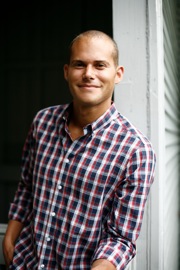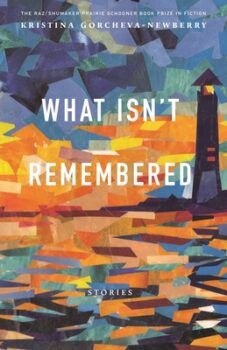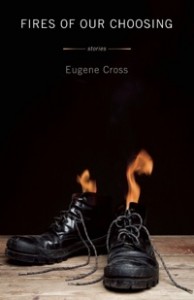 The first time I met Eugene Cross he was handing me a drink across the bar. We were off to a good start, and it only got better when I read his new collection Fires of Our Choosing (Dzanc).
The first time I met Eugene Cross he was handing me a drink across the bar. We were off to a good start, and it only got better when I read his new collection Fires of Our Choosing (Dzanc).
I’ve known Eugene a long time, running into him at the Bread Loaf Writers’ Conference (where he served drinks for several years) or in Chicago, where he teaches at Columbia College. But I don’t think I’d ever read a piece of his, though he’d placed them widely in journals like Narrative, Third Coast, and Story Quarterly. I didn’t know what to expect, or if I would like the work as much as the person. It’s a particular apprehensiveness that cuts across the arts: with something so personal, how do we navigate the space between art and artist? This only becomes a problem, of course, when our reaction to the creation is not wholly positive. It turns out, in these twelve stories, I had nothing to fear.
Focused mainly around the Lake Erie shore, these stories concern characters coming apart, little by little, their lives spun loose and rolling toward the edge. From schoolyards to dining rooms to pool halls to golden wheat fields, Cross catches men and women in transition, fumbling toward the exit as they try for an escape. It’s a wonderful read, because somewhere along the way one feels that spark of recognition with the characters: they work nine-to-fives, they do manual labor, they gamble with what they do not have. And like his characters, Cross takes risks. But, lucky for him, they pay off.
Consider this scene from the story “430.” A troubled couple stops their car after hitting a dog by accident, the man kneeling next to the dog and the woman standing over him looking down.
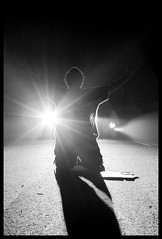
The animal whined and Roddy lifted his hand. Slowly, and with as much care as he could muster, he parted the matted hair that covered the dog’s neck. There was no collar. Blood continued to leak from the dog’s mouth, from some injury deep within that Roddy knew could not be mended.
It’s a dynamite final line, and it hits with a force that left me wondering whether Cross was talking about the dog or something deeper. The man kneeling over the dog? The woman? Their unraveling relationship? “Car accident” could easily stray into cliché, but Cross makes it a commentary on that moment of decision—the point of no return that keeps coming again and again in life. He makes it new.
Cross excels at capturing the in-between, writing with an ease and fluency that a lesser writer might not pull off. Metaphor and simile crunch together on the page like freight cars as he sets the scene, both emotionally and physically. I’m a glutton for this sort of thing, mainly because it is rarely done well. A favorite example comes at the beginning of the story “Harvesters”:
Every year was the same. The Harvest began in Texas and it was there where he joined the others, running the combines day and night in staggered lines that left wide swaths in the open fields like fingers through sand. By June they had passed through Oklahoma and on into Kansas where the world seemed flatter still and the wheat moved atop the earth like the shimmer of heat over a fire. Across into Colorado and back through Nebraska following the grain, they slept and ate in trailers too small for comfort and worked till the great sky bruised at its edges…
I read these few lines over and over again, realizing I was completely in this place, with this character. I could feel all that wheat moving around me, and see those trailers and the men living within.
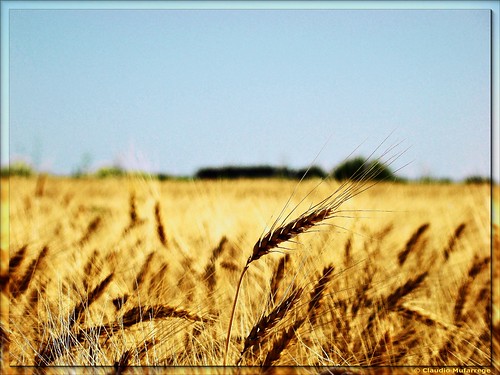
The charm of Cross’s writing comes from lines like these, lines that fix us so fully in the moment that the world outside the story disappears. It is a wonderful skill, and one Cross practices with an experienced hand, ushering one story out and another one in.
On Sundays Maggie and I never left my apartment. Sundays were for lying around, cooking Eggo waffles and bacon in our underwear, watching infomercials, having sex in the shower, and making promises we may not have made at any other time.
 These lines begin “The Brother” and might well be an entire story. In their scope, they contain a lesson on compactness: between these lines Cross sets up the entire fate of his characters; the reader just doesn’t know it yet. Plenty exists on the surface of this weekend tableau, but what the narrator doesn’t state hooks me, makes me keep coming back to that line: “making promises we may not have made at any other time.” From those brilliant eleven words flows the entire story, the flawed characters that will soon step from behind the curtain and onto the stage. And even if the story ended right there, if Cross said nothing more about them, through these few words the reader feels the shape and weight of their void.
These lines begin “The Brother” and might well be an entire story. In their scope, they contain a lesson on compactness: between these lines Cross sets up the entire fate of his characters; the reader just doesn’t know it yet. Plenty exists on the surface of this weekend tableau, but what the narrator doesn’t state hooks me, makes me keep coming back to that line: “making promises we may not have made at any other time.” From those brilliant eleven words flows the entire story, the flawed characters that will soon step from behind the curtain and onto the stage. And even if the story ended right there, if Cross said nothing more about them, through these few words the reader feels the shape and weight of their void.
There are countless moments like this in Fires of Our Choosing, lines that appear true from the moment they’ve been written and hang in the back of the mind for days afterwards. Truth be told, I’ll miss Eugene behind that bar, handing me the bourbon and gingers I love to order. Because after this it’ll be impossible to keep him under wraps for long. With Fires of Our Choosing, Cross climbs boldly into the ring with the greats, if only to deliver a decisive knockout punch.
Further Links & Resources
- Read a story from Fires of Our Choosing on The Nervous Breakdown: “Rosaleen, If You Know What I Mean.”
- In 2009, Eugene Cross won the $5,000 Dzanc Prize which allowed him to both finish the collection and support his work with refugees in his hometown of Erie, PA. Read a bit more about it in GalleyCat.
- You can read both “Harvesters” and “The Brother” in Narrative—but c’mon, people, don’t just play the field. If you have a good time on these dates, be a man about it and commit. You can get the full collection from Dzanc here.

